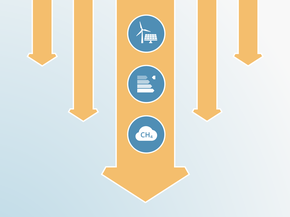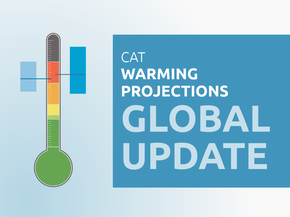Country summary
Overview
NDC update: In December 2020, Mexico submitted an updated NDC. Our analysis of its new target is here.
Mexico’s lack of ambition in its new/upcoming NDC targets, its rollback of support to renewable energy and its response to the pandemic has put the country’s emissions on a worryingly upward path. Under currently implemented policies, and even despite the expected dip in 2020 emissions as consequence of the pandemic, Mexico will not achieve its 2020 pledge and will need to implement additional policies to meet its NDC targets for 2030. The Climate Action Tracker rates Mexico’s NDC target as “Insufficient.”
In the mist of the pandemic, the Mexican Ministry of Energy published a bill (fast tracked due to COVID-19) that would effectively halt private renewable energy investment in the country, prioritising the government's own ageing, fossil fuel-fired power plants. The government said the pandemic caused a huge drop in electricity demand as factories closed and power feeds from renewable sources would have to be postponed during the pandemic. Their argument being that the intermittent nature of renewable energy projects would produce oscillation in the electrical system which the National Electrical System could not deal with.
Since 2013, Mexico has continued to report its historical emissions at higher levels than the already high emissions projections under the NDC baseline submitted in 2016. According to our assessment, based on the projected drop in GDP due to COVID-19, Mexico’s emissions in 2020 will be 13% - 14% lower than in pre-pandemic conditions. This reduction in emissions cannot be considered sustainable if the government does not introduce permanent measures to foster the structural changes needed to transition to a low-emissions economy as part of the country’s COVID-19 recovery package.
The decision to favour fossil fuel generation over renewable energy now puts Mexico on a path that is even more inconsistent with the steps needed to achieve the Paris Agreement's 1.5°C limit. Its plans for the power sector - especially the decision to continue investing in coal - stands in stark contrast to what is required to achieve the 1.5°C limit. The Paris Agreement means no new coal plants, reducing emissions from the existing coal fleet globally by two-thirds over 2020-2030 and to zero by 2050.
The Climate Action Tracker rates Mexico’s NDC target as “Insufficient.” This means that Mexico’s climate commitment in 2030 is not consistent with holding warming to below 2°C, let alone limiting it to 1.5°C as required under the Paris Agreement, and is instead consistent with warming between 2°C and 3°C.

*Based on CAT calculations.

Looking at Mexico’s current policies and taking into account the impact of COVID-19, we estimate that emissions will decrease in 2020 to between 664-696 MtCO2e per year, excluding LULUCF. Thereafter, we project that emissions will ramp up again as the economy recovers, climbing to up to 774-852 MtCO2e in 2030, excluding LULUCF.
Despite the expected drop in emissions for 2020 as consequence of the pandemic, Mexico will not achieve its 2020 pledge. Our analysis also suggests that Mexico will need to implement additional policies to meet its unconditional and conditional NDC targets in 2030, although the lower bound of the current policy range gets very close to reaching Mexico’s insufficient unconditional NDC target.
Mexico’s government is taking a step backwards on climate in the energy sector by favouring fossil fuels over renewable energy generation. This includes the construction of a new oil refinery and a new budget allocation to the “modernisation” of coal, diesel, gas and oil-fuelled power plants, some of which the previous administration had already scheduled for retirement. Furthermore, a recently published energy bill effectively halts private renewable energy investment in the country, prioritising the government's own ageing, fossil-fuel power plants(Government of Mexico, 2020).
The Mexican government cited the coronavirus pandemic as a justification for the new bill, although in 2019 it had already started deprioritising the development of other renewable energy projects by also cancelling Mexico’s 2018 “Long-term electricity auctioning” round (Energia Estrategica, 2019). The scheme was introduced in 2015 as one of Mexico’s main instruments to achieve its clean energy targets under its Energy Transition Law and General Climate Change Law.
The decision to favour fossil fuel generation over renewable energy now puts Mexico on a path that is even more inconsistent with the steps it needs to take to achieve the Paris Agreement's 1.5°C limit. Its plans for the power sector stand in stark contrast to what is required to achieve the 1.5°C limit. The Mexican government’s recent decisions also bring into question whether it will achieve its clean energy targets under its Energy Transition Law and General Climate Change Law.
Further analysis
Latest publications
Stay informed
Subscribe to our newsletter




